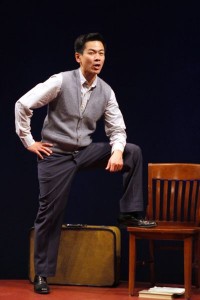JQ Magazine: Theatre Review – ‘Hold These Truths’

“This amazing life story spanning six decades manages to be compressed by playwright Jeanne Sakata into a dense 90-minute performance that both educates and entertains.” (Photo of Joel de la Fuente by Steven Boling)
A nail that stuck out but resisted being hammered down
By Stacy Smith (Kumamoto-ken CIR, 2000-03) for JQ magazine. Stacy is a professional writer/interpreter/translator. She starts her day by watching Fujisankei’s newscast in Japanese, and shares some of the interesting tidbits and trends together with her own observation in the periodic series WITLife.
The intimacy of a stage surrounded by several rows of semicircle seating at the 14th Street Y is the perfect venue for the new play Hold These Truths. This work depicts the life of Nisei (second generation) Japanese American Gordon Hirabayashi, who took it upon himself to defy Executive Order 9066, which led to the imprisonment of Japanese Americans and their families in internment camps during World War II. It is a one-man show starring Joel de la Fuente, who spellbinds the audience with his ease in slipping back and forth between Hirabayashi and the other characters he portrays. The viewer’s proximity to the performer heightens the emotional depths of Hirabayashi’s often troubling, often inspiring tale of belonging and identity.
The play begins by highlighting the Japanese phrase “deru kugi wa utareru,” or “the nail that sticks up gets hammered down,” which Hirabayashi’s parents instill in him when he is young. He internalizes this belief, but at the same time he is aware of actions that seem to go against it, such as his mom taking a case to court when her land rights are violated. He describes a peaceful childhood in Seattle where he plays with other Japanese American friends and attends picnics where their mothers bring food like “onigiri, chicken teriyaki and banana cream pie.” Raised as a Christian, Hirayabashi becomes a religious pacifist when he enters the University of Washington.
Here he stays in an international dorm and meets his first non-Japanese friends, such as his roommate and close friend Howie and his future wife Esther. He becomes involved with the YMCA as campus vice president and tries to get a job with them at the front desk, but ironically is turned down because of his race. When an 8 p.m. curfew is later put in place for the Japanese, Hirabayashi initially complies but then runs back to join his friends studying in the library. This small act of bravery is emblematic of the much bolder resistance that Hirabayashi will show going forward.
When Executive Order 9066 is issued, Hirabayashi refuses to be imprisoned along with his family. His parents plead with him, saying because he is the chonan (oldest son) he has a responsibility to join them and not cause waves within the Japanese American community. However, Hirabayashi can stick to his convictions because he knows his younger siblings can help take care of his parents, and he is imprisoned for his act of defiance.
Hirabayashi is visited in jail by an army representative, who tries to get him to capitulate by offering him a continuation of his schooling as well as a guaranteed East Coast university education for his brother. Still, Hirabayashi remains firm and continues his defiance of what he believes is wrong. He also receives ACLU representatives and a state senator with the Legal Defense Fund. The latter explains that they want to take him up as a test case, which he agrees to despite knowing the long road ahead. But perhaps his most important visitor of all is Esther, who skips class to come see him and brings the temporary comfort of a banana cream pie.
Hirabayashi’s case, along with that of two other Japanese Americans who defied internment orders, eventually makes it to the Supreme Court. They are unanimously defeated, but 40 years later when Hirabayashi has settled in Canada with his family and is teaching over there, he is contacted by a California lawyer and his case is reopened. In 1987 the verdict is overturned, and Hirabayashi is vindicated in his assertion that “ancestry is not a crime.” (The play ends at this point, but in real life Hirabayashi, who passed away in January, was posthumously awarded the Presidential Medal of Freedom in May.)
This amazing life story spanning six decades manages to be compressed by playwright Jeanne Sakata into a dense 90-minute performance that both educates and entertains. De la Fuente’s Hirabayashi is able to find levity in even the most desperate of situations, and the audience finds itself not just along for the ride, but fully experiencing the highs and lows of his life’s journey.
As the saying goes, history tends to repeat itself, and viewers are likely to find parallel examples of current constitutional and civil rights violations. This play reminds us of how thankful we should be for nails like Hirabayashi who are strong enough to stick out and speak their beliefs, as they pave the way for others who will not accept the status quo and must fight for what is right.
Hold These Truths runs through Nov. 25 at the Theater of the 14th Street Y. For additional reviews and press, visit www.holdthesetruths.info. For JQ’s exclusive October 2012 interview with Jeanne Sakata, click here.


Comments are closed.